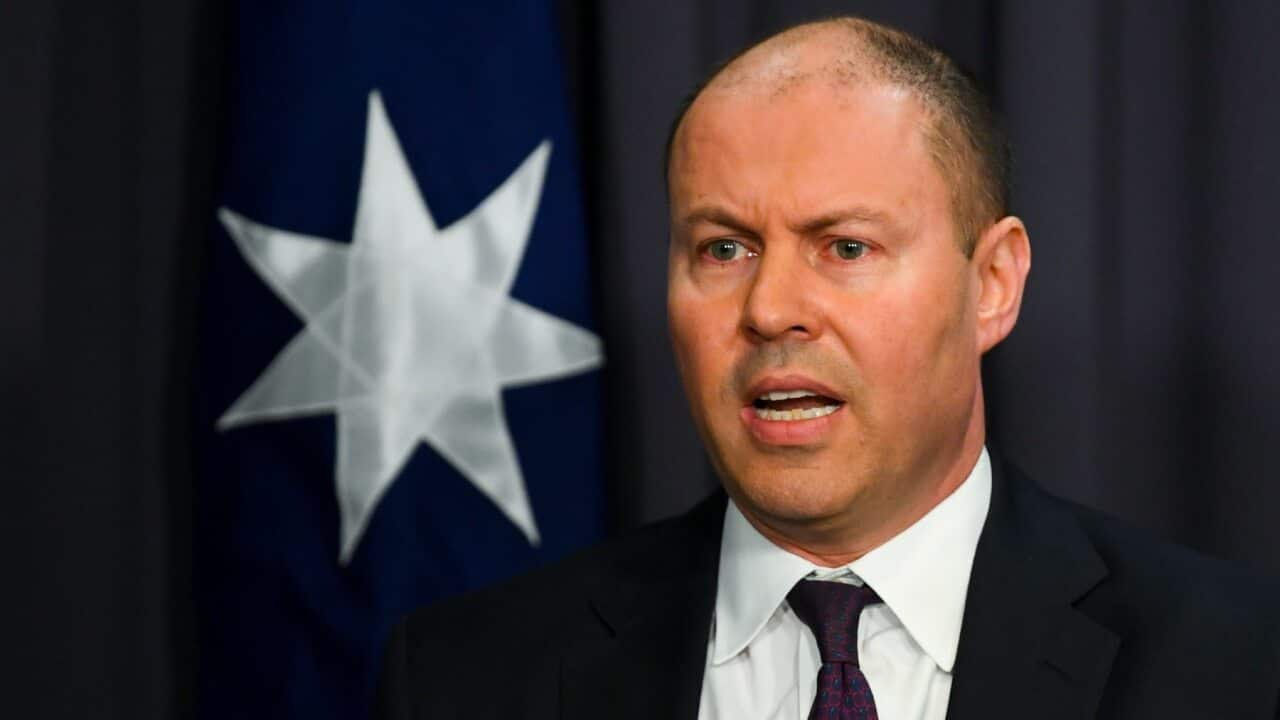Critics have cautioned against a decision to cut financial support for people who have lost work due to COVID-19 lockdowns while uncertainty around restrictions remains.
Treasurer Josh Frydenberg announced on Wednesday the COVID-19 disaster payments
The federal government insists once the 70 to 80 per cent vaccination milestones are met, lockdowns will become a thing of the past and financial support will no longer be needed.
The push is an attempt to discourage states and territories from imposing lockdowns, but has triggered warnings from unions and welfare groups that the decision has been made too soon.
Sydney-based musician and warehouse employee Mark Eccleston is among those who recently moved onto the COVID-19 disaster payment after losing working hours.
He said he is concerned about the prospect of the support being wound back while his work situation remains uncertain.
“How can you even think about that?” he told SBS News.
“That disaster relief payment is the only financial provision I have - if the government scales it back things will be far more desperate for me financially.”
The COVID-19 disaster payment currently provides $750 for people who have lost more than 20 hours of work a week and $450 for those who have lost less than that.
When 70 per cent double dose vaccination targets are reached, people will have to reapply each week for the payment, instead of it being automatically renewed.
At 80 per cent, the payment would be phased out entirely within two weeks. The first changes at the 70 per cent vaccine threshold are expected to be only a few weeks away in NSW and the ACT, and about a month away in Victoria.
The first changes at the 70 per cent vaccine threshold are expected to be only a few weeks away in NSW and the ACT, and about a month away in Victoria.

Treasurer Josh Frydenberg addresses the media during a press conference. Source: AAP
When the 80 per cent target is reached, payments would be scaled back to $450 for anyone who has lost more than eight hours of work a week in the first week of the transition.
The supplement for welfare recipients would also drop from $200 a week to $100 a week.
In week two, the payment would drop again to $320 a week for those who have lost work, while welfare recipients would receive no extra support.
Mr Frydenberg said the transition aligned with the national reopening plan that was agreed to by the national cabinet.
“These emergency payments, like lockdowns, can't continue indefinitely,” he told reporters.
“If you look around the rest of the world - the United States and the United Kingdom, Canada, Japan - people are learning to live with the virus in a COVID-safe way."
But Australian Council of Social Service CEO Cassandra Goldie has warned the decision risks creating further financial uncertainty for those impacted by lockdowns.
“It is unconscionable that the government is going to withdraw the disaster payment at a time when people are out there very financially distressed,” she told SBS News.
“People need security as constant change is rolling over them."
Around two million Australians have received the COVID-19 disaster payment.
But the opposition has also warned that some may still be out of work even when the 80 per cent threshold is met.
Labor's treasury spokesperson Jim Chalmers said financial support needs to match the economic conditions people are facing.
“If the federal government is responsible for this economic carnage then the least they can do is support people through it and help people get to the other side,” he told reporters.
“We’re not saying the support should go on forever - we’re arguing it should be tailored to the economic conditions.”
The federal government is yet to announce the future of business support payments, which are jointly funded by the Commonwealth and states and territories.
Glen Collins, the manager of Canberra pub the Dock, said his business is among those facing the prospect of reopening while restrictions on patrons remain in place.
“That will mean our staff won’t have the work because we won’t have the customers because we’ll be so restricted on capacity,” he told SBS News. The Doherty modelling behind the nation’s reopening plan indicates that lockdowns would be “unlikely” at 70 per cent vaccination rates and at an 80 per cent rate there would be no “lockdown requirement”.
The Doherty modelling behind the nation’s reopening plan indicates that lockdowns would be “unlikely” at 70 per cent vaccination rates and at an 80 per cent rate there would be no “lockdown requirement”.

Glen Collins is the manager of Canberra bar the Dock. Source: SBS News
This would remain dependent on public health and social measures such as testing, tracing, isolation and quarantine measures being maintained as restrictions are eased.
Greens Leader Adam Bandt said he feared workers were still facing the threat of lockdown restrictions without adequate income support being provided.
“The government’s own national plan envisages lockdowns continuing but the government is saying we are going to make you live through lockdowns in poverty,” he told reporters.
The Australian Council of Trade Unions says the support payments should be kept in place until all employees are back to pre-COVID conditions at work and restrictions are no longer required.
“Cutting off payments while lockdowns and restrictions are still expected is dangerous and short-sighted,” ACTU president Michelle O’Neil said.





